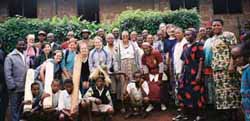TC Class Visits Tanzania
On May 30th, after attending four introductory classes, which included lessons in introductory Swahili, ten TC students set off with Professor Fran Vavrus to Tanzania as part of the new course Reading Development Policy through Practice: Experiential Learning Program in Tanzania.
"The idea behind the course was to create an opportunity for students interested in development studies and African studies to go to an African country to see whether policies actually capture the realities that people go through on the ground," explained Vavrus.
Her former colleague, Charles Moshi, who is principal of the secondary school where Vavrus taught in 1993 and 1996 in the Kilimanjaro area of Northern Tanzania, acted as the Tanzanian coordinator for the course. Two Tanzanian Form 6 graduates, which is the equivalent of freshman year in college in America, also assisted Vavrus."That provided students with a chance to talk to Tanzanians about what we were seeing, to have some cultural interpreters with us, as well as the chance to ask me how I interpreted the things we were seeing and the talks we attended," Vavrus said. "My hope is that the students in our program who are future policy makers, either for governmental organizations or non-governmental organizations, have a more informed understanding of lived reality, so that they will develop policies that make sense with the conditions of life in Tanzania and other Third World countries."
After arriving at Kilimanjaro Airport, the group stayed at the YMCA in the village of Moshi. From there they visited schools and organizations involved in community development, such as Mwereni School for the Blind, the Maasai Girls' School, Mkombozi Street Children Project and the Tanzania Environmental Action Program.
"I wanted us to travel modestly," Vavrus said. "I wanted us to visit fairly remote communities on Mount Kilimanjaro that most development ‘experts' never see, or briefly see but they don't get there on foot. We did a lot of hiking and part of that purpose was to see what it might be like to live in a community like this where you have to walk far to get water, to get to school and get to work."
Using their newly learned Swahili, each student in the TC group prepared a dialogue to introduce themselves to their hosts. "By the end, people were clapping when the students would finish, because they'd throw in some slang terms that they learned-it was very rewarding to see that," Vavrus noted.
In addition to Swahili, the preparatory coursework included a cultural history of Tanzania and an understanding of more recent economic developments in the country, particularly the structural adjustment programs that were put into place in the 1980s and how that has changed many aspects of life. Vavrus said she wanted the students to develop a deeper understanding and do deeper cultural evaluations of the area rather than speedy assessments, which tends to be more the norm in development work. "You have breadth and you do things quickly, rather than depth that comes from knowing a place well and committing yourself to learning the language and learning the political, economic and cultural history," she said.
Vavrus was proud of the interactions between the TC students and the communities they visited, in what she considers her home away from home. "Watching students interact so maturely and with such great cultural sensitivity was very satisfying," she said. "Based on the questions students asked, based on our meetings with government officials, school leaders, teachers, students, NGO officials-they were reading the policy carefully and asking informed questions to probe people involved in policy about the possible limitations of the policies they had developed."
Tonya Homan, a doctoral student who was part of the group, said, "It made policy come alive. When you get into these jobs, you have limited parameters from which you can act. People get stuck in their policy writing, because they can't visit communities as often as they would like."
Homan added that she plans to continue studying Swahili and hopes to work with AIDS orphans in Tanzania.
Yuko Nonoyama, a Ph.D. student in Comparative International Education, took the course after having worked in Sub-Saharan Africa for five years in a governmental agency. "I think I wanted to have a different perspective-how policies play out in the communities, how it affects the communities and how it is affected by the communities as well," she said. "I think you can only learn by really seeing it and hearing how people speak."
The group also stayed at a wildlife park in a colonial style game lodge built in the 1940s or 1950s that was featured in the John Wayne movie, Hatari! That part of the course allowed them to look at environmental policy and conservation. They learned that while there are benefits to this kind of conservation, there are also problems created for the surrounding community when elephants and wild pigs escape from the park and trample their crops. "So they chase the elephants away with sticks they light on fire at night," Vavrus explained, "and once you see that situation, it's hard to endorse the policy that leads ultimately to hunger because they have lost their maize crop."
The development of this course was made possible by a Faculty Diversity Award from the Faculty Executive Committee's Subcommittee on Race, Culture and Diversity from the Office of Community and Diversity at Teachers College.
Vavrus noted that conducting a course in Tanzania may seem very unusual since it is far removed from the lives of most Americans. Yet she points out that "There are many Africans working on 125th Street and living in the New York area. Understanding the communities where Africans who are living in New York come from would help us serve them in schools here."
More information about the course and this group's experience in particular are available via Vavrus' Web page by visiting www.tc.edu/faculty/vavrus/Tanzania4.htm.
Published Tuesday, Sep. 9, 2003
